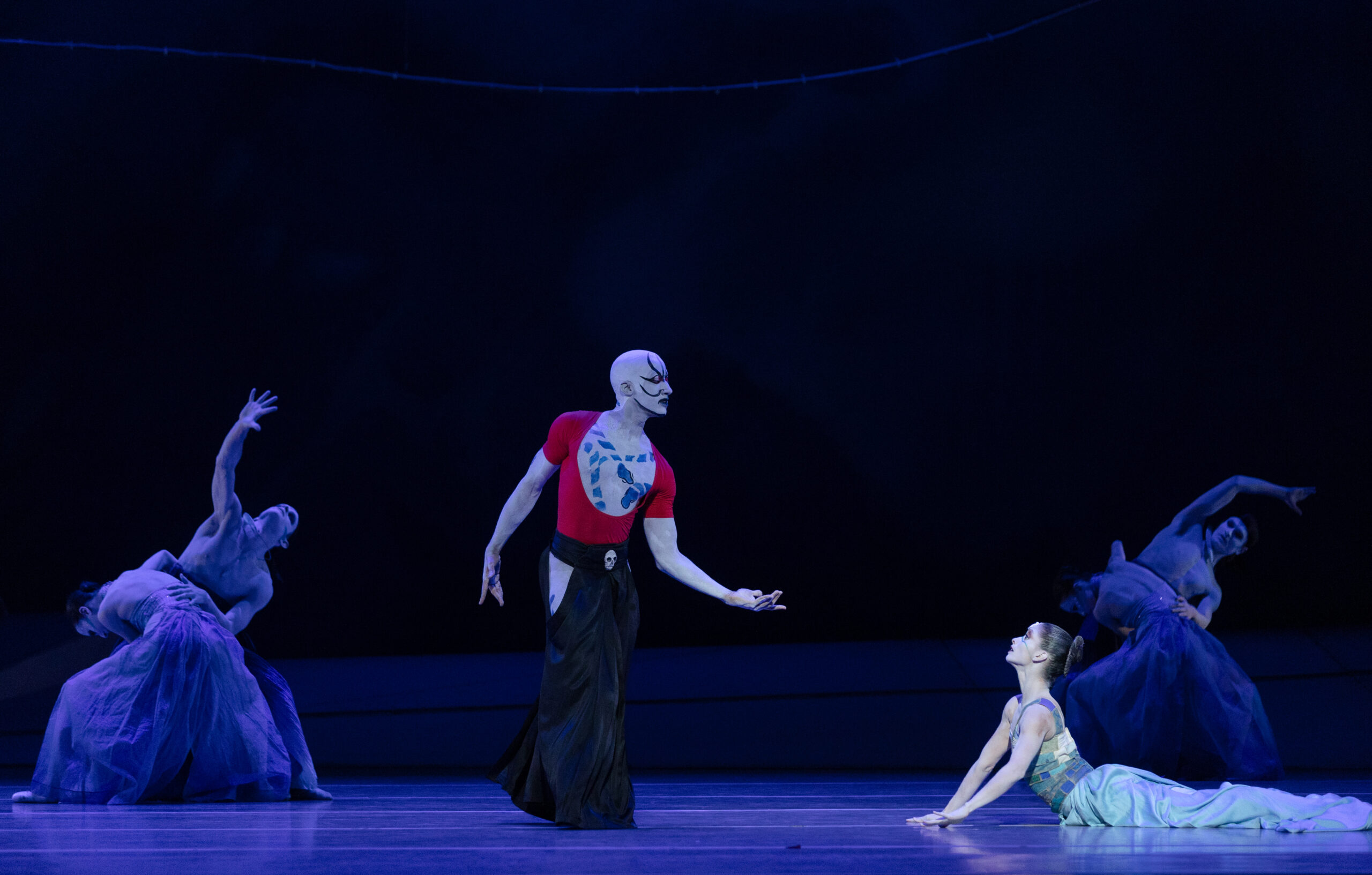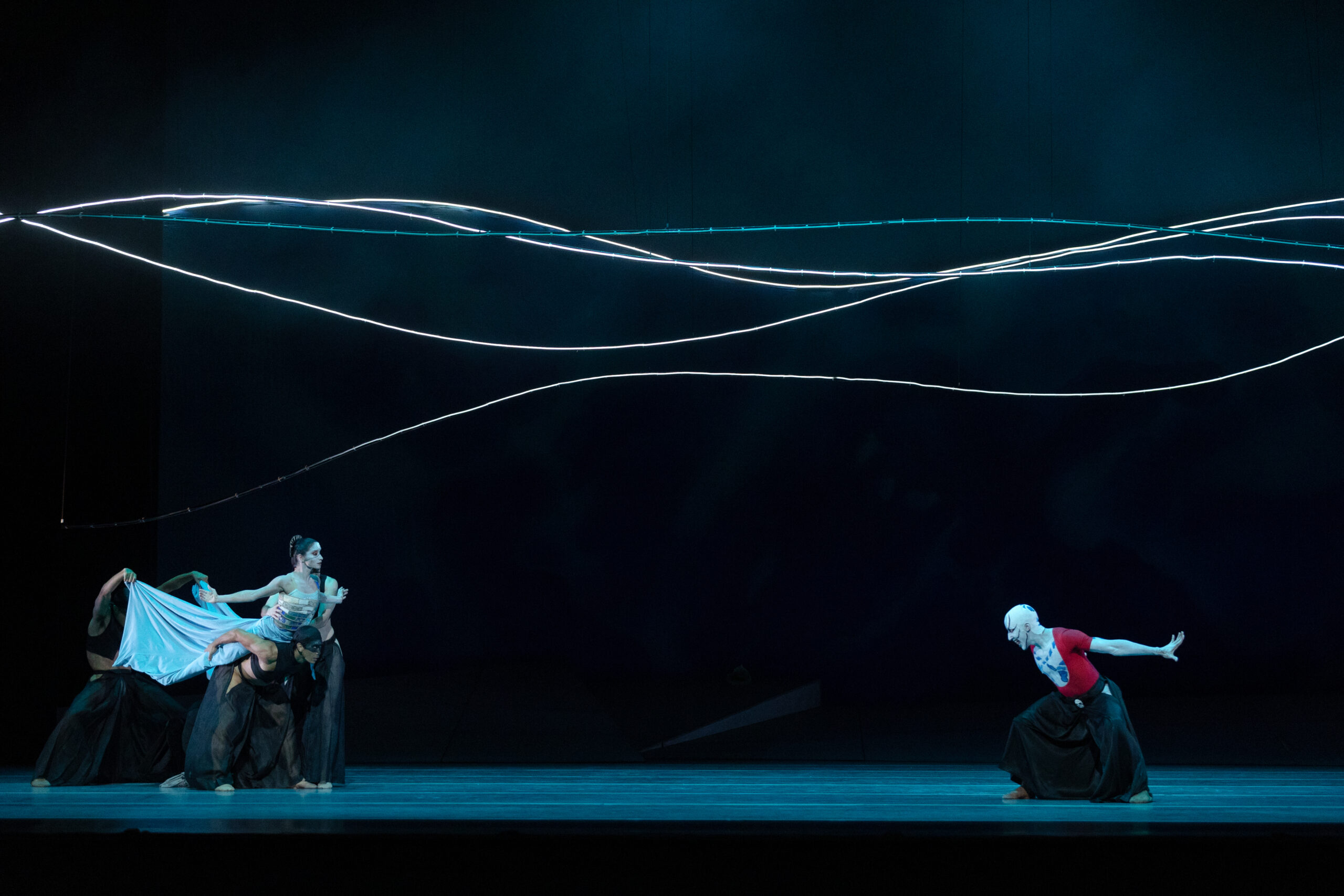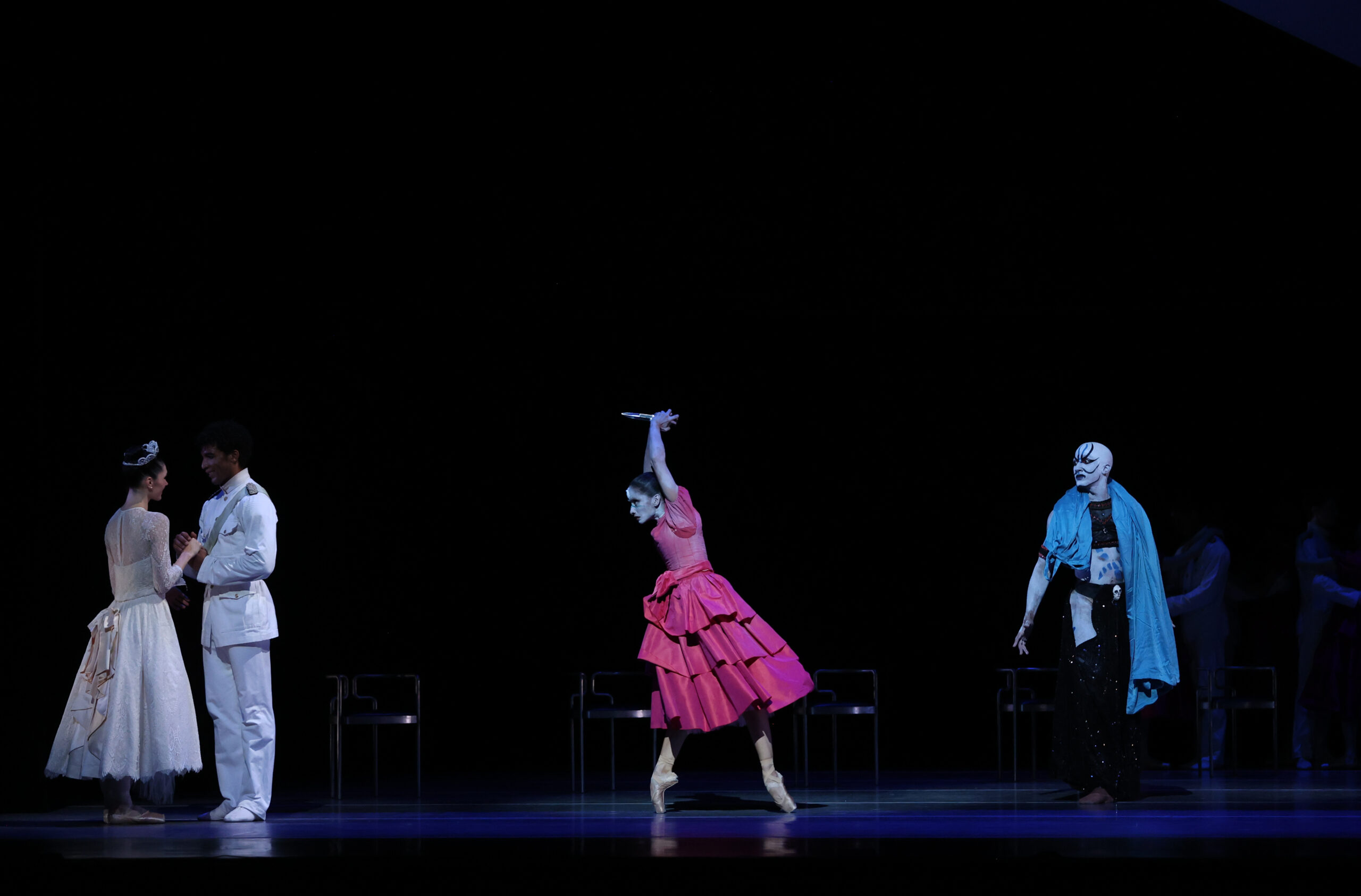Houston Ballet’s Little Mermaid Goes Far Beyond the Disney Story — This Dazzling Show Captures True Heartbreak and Underwater Longing
A Performing Arts Devotee's Review
BY Adrienne Jones // 09.13.24Houston Ballet principal Karina González as The Little Mermaid/His Creation and first soloist Gian Carlo Perez as Edvard/The Prince, with Artists of Houston Ballet in John Neumeier’s "The Little Mermaid." (Photo by Amitava Sarkar)
Houston Ballet opened its season with a breathtaking production of John Neumeier’s The Little Mermaid. This captivating ballet, based on Hans Christian Andersen’s iconic 1837 fairytale, was created in 2005 by Neumeier for the Royal Danish Ballet to celebrate Andersen’s 20oth birthday. It runs through this Sunday, September 15 at Wortham Theater Center.
Neumeier is widely recognized as one of the brightest stars in contemporary ballet. After 50 years as the director of the Hamburg Ballet, he retired this year. His impressive career includes more than 160 works for dance companies worldwide, blending ballet tradition with modern dance in masterful ways.
Houston audiences lucky enough to see this production of Little Mermaid are witnessing Neumeier’s rare, imaginative genius.
Astonishingly, Neumeier not only choreographed but also designed the costumes and minimalist sets for this ballet. He even commissioned Russian-American composer Lera Auerbach, working closely with her to shape his vision. The result is a rarely seen harmony of theatrical elements.
What unfolds on the Houston stage is a brilliant execution of Neumeier’s vision, brought to life by the artistry and skill of the Houston Ballet dancers. Every performer exceeds the high bar set by this complex work.
Not Your Disney Version of The Little Mermaid
Audiences should note that Andersen’s original story differs greatly from Disney’s 1989 cartoon Little Mermaid movie or its 2023 live action remake .
Neither the fairytale nor the ballet ends with the Prince returning to the Mermaid. She sacrifices everything — her voice and her royal life beneath the sea. She does this to become human and win the Prince’s heart, though that love was never guaranteed.
The Prince, a naval captain, has no idea the injured young woman aboard his ship is the one who saved him from drowning. It seems natural he would fall in love with the glamorous human Princess, who is eager to win him from the moment they meet.
“The lesson is that no matter how much we love, it does not make our love object responsible to us,” Neumeier explained to a Houston Ballet Dance Talk audience. “This is so hard to understand. But then we understand real love. Because real love is not the feeling I get from love, but the fact that I love.”
Historians now suggest Hans Christian Andersen himself never found lasting love, despite the deep longing reflected in his letters and diaries.

Neumeier adds a new layer to the original story by introducing Andersen as a complex character — the Poet. This creates a shadowed, play-within-a-play dynamic. The Poet not only shapes the Mermaid’s suffering but also reflects Andersen’s own pain from his unrequited love for his real-life friend Edvard Collin.
Neumeier is fully aware of the layered narrative he crafted.
“Anderson, who is trying to translate his relationship through the Mermaid, makes for a very complex emotional situation,” he says. “But I have never been simple in my life because I don’t think our life is simple.”
Neumeier’s Immortal Twist on Andersen’s Tale
Interestingly, Andersen’s tale, like many from that era, includes a spiritual element, which Neumeier draws upon to elevate his story. Although the characters are make believe, they grapple with profound questions about immortality and the human soul.
In the fairytale, the Little Mermaid learns that humans have immortal souls, while mermaids simply dissolve into sea foam upon death. Desperate to gain a soul of her own, the Little Mermaid’s told the only way to do so is through the love of a man. His love could transfer his soul to her, granting her the immortality she craves.

Faced with the harsh reality that the Prince will never return her love, the Little Mermaid wrestles with her dire choices. Although she knows that killing him would allow her to return to the sea, she refuses to commit this act. In the ballet, it is not the Prince’s love but the Poet’s that ultimately grants her the immortal soul she yearns for.
Through her purity and goodness, the Little Mermaid, in a way, immortalizes Andersen — the Poet.
“It is neither a tragic nor a happy ending,” Neumeier says. “Never happy in his personal life, Andersen’s salvation was his work.”
As the Poet, Andersen makes his Little Mermaid a daughter of the air. In a final pas de deux, they dance together, transcending into a realm among the stars.
Houston Ballet’s Enchantment Under the Sea
Houston Ballet’s Little Mermaid opens in silence. Music begins only in the prologue when the Poet’s tear drops into the sea from his perch on an ocean liner. His memories of Edvard’s wedding and their separation shape the narrative that grips the audience until the final curtain. Edvard’s bride Henriette becomes the Princess. Edvard becomes the Prince that the Little Mermaid loves.
The first scene, bathed in a soft blue light, is one of the most spellbinding in ballet. Set on the ocean floor where mermaids and sea creatures dwell, their graceful movements and Auerbach’s beautiful music transport viewers to a timeless underwater world.
Karina González as the Little Mermaid is a vision of innocence and grace. Her movements, which suggest swimming, are beautifully enhanced by her costume and the masked dancers who lift her with striking precision. The cleverly designed, silk-like divided skirt extends several feet beyond her legs, simulating a fish tail and amplifying the illusion of underwater motion.
After the Sea Witch’s curse in “The Ritual of Transformation” takes hold — stripping her of her voice and turning her tail into human legs — it becomes difficult to watch González. Her portrayal of the Little Mermaid’s psychological and physical anguish, as if walking on broken glass, is deeply moving.

Beckanne Sisk, in her roles as the Princess and briefly as Henriette, shines with elegance and poise. Her portrayal of the Princess is both heartfelt and nuanced. She strikes the perfect balance in her acting, capturing a range of emotions from affection to jealousy with subtlety and depth.
Gian Carlo Perez, in the dual role of the Prince and Edvard, is a commanding presence. He imbues the Prince with a vibrant dynamism and technical prowess, hinting at the potential of more captivating roles to come.
Neumeier’s involvement in Houston was crucial to the production’s success. The opening night concluded with a memorable moment, as Neumeier joined the cast on stage for a final bow, delighting the audience.
Houston Ballet’s “The Little Mermaid” runs through this Sunday, September 15th at The Wortham Theater Center. For more information, go here.


























_md.jpeg)













